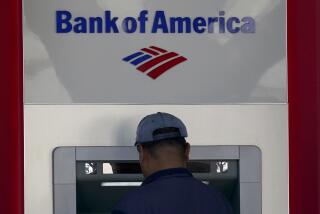Bankers Trust to Revamp Derivatives : Investment: The unusual agreement with the Fed comes in the wake of clients’ big losses.
WASHINGTON — Under fire for arranging investments that went sour, Bankers Trust New York Corp. agreed with the Federal Reserve Board to overhaul part of its derivatives business, the central bank said Monday.
It was the first time the Fed has taken a bank under supervision in the area of derivatives, a Fed spokesman said. “A written agreement is a serious enforcement action, enforceable through the courts,” he said.
A written agreement is the second-most serious of three reprimands that regulators impose on banks and their units.
The unusual agreement comes after Bankers Trust’s clients, among them consumer products firm Procter & Gamble Co., revealed millions of dollars in losses from derivative investments arranged by the bank.
Although derivatives--complex financial instruments based on an underlying security--are designed to hedge against risk, some of the investments lost enormous amounts of money when interest rates turned sharply upward last year.
One of the biggest losses in the area--unrelated to Bankers Trust--was disclosed last week when Orange County said its investment fund had lost $1.5 billion in value, partly because of derivatives.
The agreement between the Fed and Bankers Trust amounts to a huge housecleaning of the bank’s derivatives business, one of the biggest of any bank. It calls for everything from new policies to greater management oversight--all under the supervision of the Fed.
“This is a rap on the knuckles for Bankers Trust,” PaineWebber Inc. analyst Lawrence Cohn said.
“No matter how you slice it, Bankers Trust has agreed to change its conduct and has implicitly agreed that it was not acting properly in the past. There is no question that these were bad boys,” Cohn said.
Bankers Trust said disciplinary actions were taken against certain individuals as part of the agreement. It emphasized that the agreement with the Fed is limited to the company’s leveraged derivatives transaction business, which accounted for less than 5% of its total revenue from Jan. 1, 1993, through the first three quarters of 1994.
The agreement states that the policies must ensure the bank’s derivatives business is “consistent with safe and sound banking practices.”
More to Read
Inside the business of entertainment
The Wide Shot brings you news, analysis and insights on everything from streaming wars to production — and what it all means for the future.
You may occasionally receive promotional content from the Los Angeles Times.










